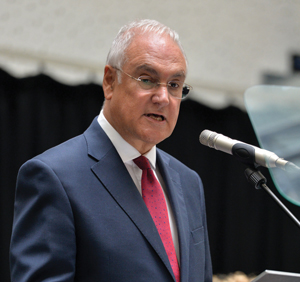The Association of Colleges (AoC) has launched a manifesto setting out key issues affecting FE that it wants the next government to take on board.
President Richard Atkins spelled out the document’s 10 key demands (set out below) to delegates at the AoC’s annual conference in Birmingham on Wednesday (November 19).
He called on colleges to use the manifesto to raise the issues with their local parliamentary candidates in the build-up to the general election.
Mr Atkins said: “As a colleges sector, we demonstrated our unity and our strength when we lobbied against the unexpected and iniquitous 18+ funding cut last December.
“Between now and May 7 next year, we need to argue our case, on behalf of our students and staff, with the same urgency and energy.”
The manifesto tackled a number of thorny issues including careers advice for 11 to 18 year-olds and called for a new careers hub between schools, colleges and universities.
The document stated: “We have expressed our concern about recent policy decisions, particularly placing a duty on schools to secure careers advice for their pupils, but with no funding attached.
“The next government needs to work with schools and colleges to reintroduce systematic careers education into the curriculum.”
It also called for funding cuts to be stopped for 16 to 18-year-old education.
The document stated: “There should be no further cuts to spending on 16 to 18-year-olds and, immediately on taking office, the next government should bring this age group within the protective ringfence.
“By the end of the first year of the next parliament, a once in a generation review should be conducted setting out how much is required to adequately educate or train children and young people.
“The results of this review should be implemented by the end of the next Parliament in 2020 at the latest.”
The manifesto also called for reform to the the government’s flagship traineeships.
It said colleges were finding it difficult to convince employers to take on trainees through the scheme introduced in September, aimed at 16 to 24-year-olds, while the number of 16 to 18-year-olds apprentices had declined.
The document stated: “This is because in most sectors businesses are reticent about employing an apprentice this young.
“To address this increasing concern, traineeships should be converted into pre-apprenticeship training, specifically created to prepare 16 and 17-year-olds for a full apprenticeship.
“This training should last two years, be set at level two and include the soft skills so desperately needed by employers.”
Visit here to download the full manifesto
Here are the AoC’s manifesto demands:
1. The next Government should introduce systematic careers education for 11 to 18-year-olds and facilitate a careers hub between schools, colleges and universities in each area, led by the local enterprise partnership
2. All adult students, whether studying at university or college, should have equivalent access to grants and loans via new education accounts. The Government, the student and their employer should contribute to this account
3. Transport legislation has not caught up with the fact that everyone is now required to participate in education and training until their 18th birthday. The transport rights for 16 to 18-year-olds in education should mirror those which apply to
school children
4. The next Government should reform the higher education system to ensure it can respond quickly in training the engineers, technicians and professionals of the future. FE colleges should be given the power to award higher technical and professional certificates, in partnership with employers
5. The next Government should reform the higher education system to ensure it can respond quickly in training the engineers, technicians and professionals of the future. FE colleges should be given the power to award higher technical and professional certificates, in partnership with employers
6. The way students are assessed in school and college should reflect the fact that we learn in the workplace and at university incrementally, not solely through end of year exams. The next Government should maintain AS Levels in their current form and should allow for rigorous modular assessment in vocational and academic qualifications, alongside final exams
7. The next Government should continue to allow colleges the freedom and flexibility to respond to the needs of their community and local businesses, rather than setting rules from Whitehall
8. To enable colleges and schools to meet the OECD challenge, the next Government should develop new English and maths qualifications which allow students, aged 16 to 19 and adults to gain the skills that businesses need
9. There should be no further funding cuts to the education of 16 to 18-year-olds and they should be brought within the Government’s protective ringfence. The next Government needs to conduct a once in a generation review of how money is spent at each stage of compulsory education to ensure the budget is used most effectively
10. New schools should only be approved where there is genuine local demand because of poor quality provision and/or rising pupil numbers



